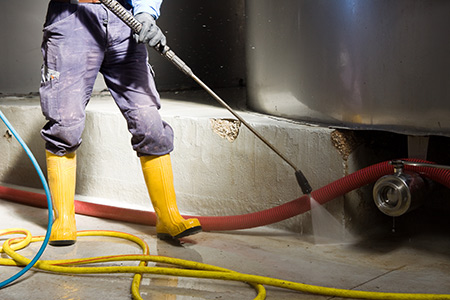How do pressure washers work?
Pressure washers are really useful cleaning tools for all types of businesses, whether for a periodic “spring clean” or for regular daily use.
On the face of it, pressure washers are quite straightforward. Water enters the machine where it is pumped and expelled under pressure, and then aimed at the surface you want to clean. There’s more to it than that though (as with most things in life!).
In this article, we’ll try to explain some of the key factors in choosing a commercial pressure washer to suit your needs.

Water pressure, water flow and temperature
People often assume that higher the pressure, the more efficient the machine, but actually the volume of water flow is very significant and using hot water under pressure (or even steam) can help to remove tough and resilient dirt.
Larger areas require a high water flow with lower pressure for effective cleaning. A car park, driveway, or tennis court for example, need a heavier flow to clean the dirt and rinse it away, rather than a high pressure, narrower water jet, which would be less effective and would also take too long, as the jet could only be applied to a small area at a time. Using a “high pressure” jet can also damage some types of surface. Another thing to consider is the temperature of the water – hot pressure or steam washers can provide really deep cleaning with less force.
For smaller surfaces with adherent grime, high pressure and a lower flow volume, e.g. as found in the Karcher HDS 12/18-4s, would be the best method as the water jet is more powerful in a narrower area, allowing more forceful cleaning. One thing to consider when carrying out this operation is of course that water does not discriminate, and a high pressure washer needs careful handling to avoid soaking the wrong things (for example the person operating it!).
Can the water pressure be varied?
Yes, most pressure washers can be adjusted within a range. In commercial premises where food is prepared or handled, there is often a requirement for pressure washing, and here the balance between pressure and flow becomes more important as hygiene is critical. Where food is concerned, cleaning away the unwanted residue brings the risk of scattering some of it if the pressure is too high, or of spreading particulate to other areas.
A multi pressure system allows for varied pressures to be used for different parts of the cleaning process, so a lower pressure with high flow can be used for the removal of debris and a higher pressure, with lower flow can be used where deep cleaning is required. The type of system, cleaning agents and method of delivery is dependent on the environment being cleaned and the type of debris being removed.
Where do you want to use your pressure washer?
This can be a significant question, in determining the type pressure washer you need.
Access to a power supply
There are a lot of electric powered pressure washers available, some of which run on a 110v supply, so can be used on building sites for example. But you need to think about the area you want to cover and its proximity to a power supply. This might lead you towards a diesel or petrol powered pressure washer, which enables you to clean over larger areas, as long as you have access to water.
Access to a water supply – trailer mounted pressure washers
For really large areas, you could also consider a trailer mounted pressure washer. These are serious industrial strength machines, using water stored in a bowser, with a diesel powered engine creating hot or cold water under pressure. With an integrated trailer, this type of pressure cleaner can be used virtually anywhere. They are quite expensive machines to buy, so if you don’t need to use one all the time, you can hire one (see our pressure washer hire rates here).
Static pressure washers
Or, depending on what you are cleaning, can you bring the dirty objects to the cleaner? In this case, a static pressure washer is a cost effective, secure and robust solution, with a range of water flow and pressure options. The MAC Plantmaster for example is ideal for vehicle cleaning and a range of industrial cleaning applications, fully weather proof and lockable, it’s safe to leave it outside all year round.
There is more to pressure washing than meets the eye and with so many different types of machine to choose from, with a wide range of prices too, it can be difficult to choose. Some of the key points to consider:
- What type of dirt needs to be cleaned (loose, tough, oily, greasy etc)
- Whether you want or need to use chemicals
- What size of area you’re cleaning and how often
- What else is in the vicinity that could be damaged if it’s caught in the crossfire!
- Access to power and water supplies
Want to find out more about pressure washers?
 Have a look at our pressure washer terminology guide which explains the terms typically used by manufacturers, so you’ll be able to compare different pressure washer specs.
Have a look at our pressure washer terminology guide which explains the terms typically used by manufacturers, so you’ll be able to compare different pressure washer specs.
What we can say is that it’s worth spending some time making sure you have the right pressure washer for the job – then you’ll get the best cleaning result, in the least time. We can help with that. Tell us what you need to clean and we’ll give you our honest opinion about the pressure washers we think will work best for you.

